Through wide-scale research including 4,800 boys and girls aged between 10 and 18, researchers from the Adam Mickiewicz University in Poznan and the Norwegian University of Agder in Kristiansand are seeking to identify the main causes of the constant health deterioration of Polish lower secondary school students. The project has been awarded a €540,000 grant by the Polish-Norwegian research fund.
The research project follows a study conducted in 2009, showing that one in three Polish teenagers has made an effort to slim down at least once in his or her life, and 40% would like to lose weight. At the same time, one in five young people admits to having health problems.
Study of vital interest
Through the study, the researchers have gained valuable knowledge about physical development during juvenescence and the crucial factors hindering development processes as well as elements of risk, such as obesity, civilisation diseases, and the incidence of certain viruses.
“Juvenescence is of vital interest due to biophysical and psychosocial changes and intensification of hazardous behaviours - like tobacco use, alcohol consumption and drug abuse - which have consequences not only for people’s actual health condition, but may perpetuate bad habits, and in the end become a danger to health during adulthood”, explained Professor Maria Kaczmarek of the Adam Mickiewicz University in Poznan.
Planning a health awareness policy
The project has resulted in a report on the health situation and health needs of young people in Poznan and Wielkopolska in Poland, which in turn will help in the planning of a regional health awareness policy.
The exchange of experiences between the Polish and the Norwegian researchers throughout the research process also brought positive surprises, according to Kaczmarek.
“What fascinated us the most was the close collaboration of the Norwegian researchers involved in the project with town authorities and the local community [in Norway]. The researchers participated in city council meetings and had a decisive voice, for example, in the matter of marking out bicycle lanes or constructing school sports grounds.”
Illustration photo: Piret Marvet, Royal Norwegian Embassy, Tallinn
